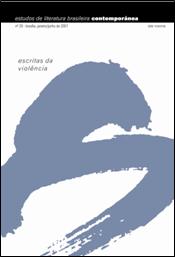No entremeio do trágico:
Perlongher e os “Cadáveres” da Nação
Abstract
O objetivo deste artigo é indagar os implícitos identitários da “aportunholada” escrita do poeta e antropólogo argentino Néstor Perlongher (1942-1992) a partir de sua radicação no Brasil
(1982). Procurando estabelecer um diálogo entre extraterritorialidade e o uso estético do portunhol como língua de “entremeio”, o artigo analisa as relações entre nacionalidade e língua, e tenta, através da leitura da escrita de Perlongher como antimonumento, repensar a transgressão que a mesma representaria para o caráter trágico/sacro do discurso identitário nacional.
References
AIZENBERG, Edna. “Holocausto, memória judaica e memoriais do terror no cone sul”. Remate de males, 26.1, Instituto de Estudos da Linguagem ”“ Unicamp, jan.-jun. 2006, pp. 71-80.
ALCALDE, Ramón. “Ilusiones de isleño”. Sitio, nº. 3. Buenos Aires, dez. 1983.
ANDERSON, Benedict. Comunidades imaginadas: reflexiones sobre el origen y la difusión del nacionalismo. México: FCE, 1993.
CANGI, Adrian e SIGANEVICH, Paula (comps.). Lúmpenes peregrinaciones: ensayos sobre Néstor Perlongher. Rosario: Beatriz Viterbo, 1996.
DE CAPOA, Chiara. L’Ancien Testament: Repères iconographiques. Paris: Hazan, 2003.
DERRIDA, J. Le monolinguisme de l’autre. Paris: Galilée, 1996.
FREUD, Sigmund. “Moisés y la religión monoteísta: três ensayos” em ______. Obras completas. Buenos Aires: Hyspamerica, 1988. v. 19.
GASPARINI, Pablo. “Riscos do português/Riscos do castelhano (a língua portuguesa na poesia do argentino Néstor Perlongher)”. Ipotesi, v. 9, nºs. 1 e 2, Universidade de Juiz de Fora, 2005.
JINKIS, Jorge. “A la tíbia musa, de um vate desencantado”. Sitio, nº. 3. Buenos Aires, dez. 1983.
LEYLAND, W. (org.). My deep dark pain is love. San Francisco: Gay Sunshine Press, 1983.
MAFFESOLI, Michel. O instante eterno: o retorno do trágico nas sociedades pós-modernas. São Paulo: Zouk, 2003.
MELMAN, Ch. Imigrantes: incidências subjetivas das mudanças de língua e país. São Paulo: Escuta, 1992.
PERLONGHER, Néstor. Alambres. Buenos Aires: Último Reino, 1987.
______. Austria-Hungría. Buenos Aires: Tierra Baldía, 1980.
______. Evita vive e outras prosas. Trad. de Josely Vianna Baptista. São Paulo: Iluminuras, 2001.
______. Lamê. Trad. de Josely Vianna Baptista. Campinas: Unicamp, 1994.
______. O negócio do michê: prostituição viril em São Paulo. São Paulo: Brasiliense, 1987.
______. Poemas completos. Buenos Aires: Planeta, 1997.
______. Prosa plebeya. Buenos Aires: Colihue, 1997.
______. “Lamborguini, Carrera, Lamborguini: un ‘nuevo’ verso rioplatense?”. Documento 0790. São Paulo, jun. e jul. 1982. 18 pp. (doc. c/ correções ms. e xerox).
PONGE, Francis. Le savon. Paris: Gallimard, 1992.
SCHWARTZ, Jorge (org.). Cuadernos de Recienvenido, nº. 18, Homenaje a Néstor Perlongher. Universidade de São Paulo, 2000.
STEINER, George. Extraterritorial: ensayos sobre literatura y revolución lingüística. Barcelona: Barral, 1973.
TOURN, Lya. Chemin de l’exil: vers une identité ouverte. Paris: Editions Campagne Premiere, 2003.
Downloads
Published
Issue
Section
License
Authors who publish in this journal agree to the following terms:
a) The authors maintain the copyright and grant the journal the right of first publication, the work being simultaneously licensed under the Creative Commons Attribution License-Non Commercial 4.0 which allows the sharing of the work with acknowledgment of the authorship of the work and publication this journal.
b) Authors are authorized to enter into additional contracts separately, for non-exclusive distribution of the version of the work published in this journal (eg publish in institutional repository or as a book chapter), with authorship recognition and publication in this journal.
c) Authors are allowed and encouraged to publish and distribute their work online (eg in institutional repositories or on their personal page) after the editorial process, as this can generate productive changes, as well as increase the impact and citation of published work (See The Effect of Free Access).
d) The authors of the approved works authorize the magazine to, after publication, transfer its content for reproduction in content crawlers, virtual libraries and the like.
e) The authors assume that the texts submitted to the publication are of their original creation, being fully responsible for their content in the event of possible opposition by third parties.


